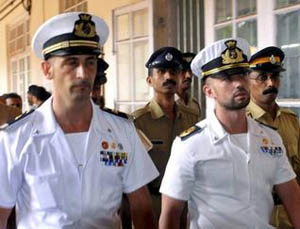 United Nations, Mar 18: Italy has appealed to the United Nations to help free its two marines who are being tried in India for killing two Indian fishermen in 2012.
United Nations, Mar 18: Italy has appealed to the United Nations to help free its two marines who are being tried in India for killing two Indian fishermen in 2012.
"Italy is willing to try the marines at home, but in the meantime we ask for their freedom," said interior minister Angelino Alfano was quoted as saying by ANSA news agency.
Alfano's remarks came ahead of his meeting with UN secretary general Ban Ki-moon here.
Italy has been trying to rally international support among the EU, the US and NATO countries to bring home marines.
Marines Massimiliano Latorre and Salvatore Girone shot dead two fishermen off the Kerala coast in February 2012, sparking diplomatic tensions between India and Italy.
The marines, deployed on the Italian-flagged oil tanker MT Enrica Lexie, said they mistook the fishermen for pirates. They are now staying in the Italian embassy in New Delhi awaiting trial.
India has removed the possibility of a death penalty but insisted that the marines would still be prosecuted under the anti-piracy law. Now, they face up to 10 years in jail.
Rome wants the marines to be tried in Italy, claiming the incident took place in international waters. However, New Delhi says it has the right to try the Italians as the victims were Indians on board an Indian fishing boat.
Italy argues that the case sets dangerous and wide-ranging precedents for any country involved in anti-piracy missions overseas.
Lats month, UN chief Ban Ki-moon's spokesperson Martin Nesirky told reporters that the secretary general is "concerned that this long-standing matter between Italy and India remains unresolved and is prompting tensions between two friendly and important Member States of the Organisation."





Comments
Add new comment